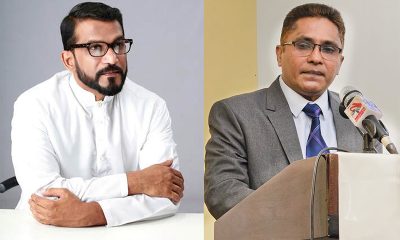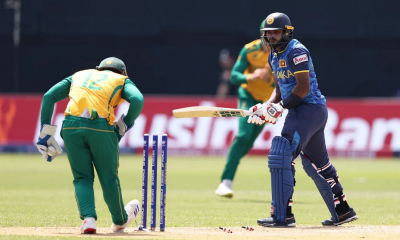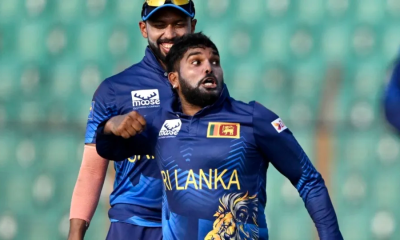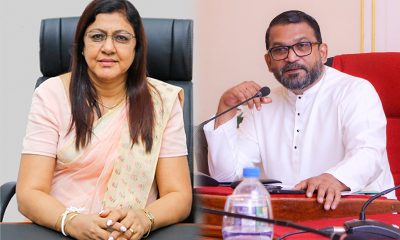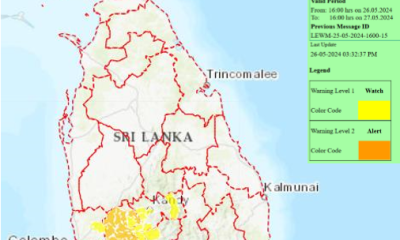News
State Minister hails Sri Lanka’s ‘civilisational link’ with India, calls China ‘important trading partner’

Minister of State for Foreign Affairs Tharaka Balasuriya spoke to WION’s diplomatic correspondent Sidhant Sibal on the sidelines of Raisina Dialogue 2024 in New Delhi.Balasuriya weighed in on several issues ranging from the India-Lanka relationship, Colombo’s ties with China, tourism, Unified Payments Interface (UPI), and more.
While speaking on China, Balasuriya said that “both countries are friends”, but in India’s case it’s a “civilisational link” as he pointed out the historical connection of cultures. He said that China is an “important trading partner”, but so are other countries.
The excerpts of the full interview:
WION: How do you see the India-Sri Lanka relationship, especially in the light of financial connectivity? We recently saw the launch of UPI in your country.
Tharaka Balasuriya: I think India and Sri Lanka’s relationship is at an all-time high. The UPI is beneficial for both countries. If you look at the events of Sri Lanka and what took place one and a half years ago, it mainly started out as a foreign exchange crisis mainly a lack of dollars. So we have to ensure that our dollar dependency is reduced. And we now for example, our biggest tourist market is from media and if we can collect the tourist’s remittance from India and we import about $5.5 billion worth of goods from India and use the Indian rupees, to pay for the Indian imports, then we will reduce our dollar dependency and it also becomes very flexible and it becomes very easy for the Indians to travel to Sri Lanka and then they pay in Indian rupees.
WION: Sir, essentially we recently saw the Indian External Affairs Minister saying that one should go to Sri Lanka. How do you see that comment and how do you see Sri Lanka as a tourist destination for many Indians?
Tharaka Balasuriya: Have you visited Sri Lanka?
WION: I have visited Sri Lanka but not on a very fortunate note. It’s after the Easter bombings but maybe I’ll visit on a happier note.
Tharaka Balasuriya: Your External Affairs Minister is absolutely correct because Sri Lanka is a country with an area of over 65,000 square kilometres, but it has something for everybody. It’s no wonder Marko Polo said it’s the best island of its size in the world. We have some of the best beaches in the world. We have the hill country which is very cool in temperature and we have wildlife and wildlife parks for example, the Yala National Park has the highest concentration of leopards in the world.
We have the historical the cultural triangle, which is to pass and then we also are trying to develop the Ramayana trail. We have five Shiva Lingam temples in Sri Lanka. And also Sri Lanka is in close proximity to India. So the maps when you look at the ticket prices for somebody in the North of India to travel to the southern city and for that person to travel to, Sri Lanka, I don’t think there’ll be much of a cost difference. So I would encourage all Indians to visit Sri Lanka and it will be absolutely a brilliant experience.
WION: There is the China factor as well when it comes to the India-Sri Lanka relationship and the Sri Lanka-China relationship. Is it an act of balancing or is India your natural ally?
Tharaka Balasuriya: When you say it’s our natural ally I think that has an implication saying in other countries our enemy or something. No, it’s not like that. You know, both countries are friends, but in India’s case, it’s a civilisational link. You know, if you read the books, the people of Sri Lanka came from India. Sri Lanka is a Buddhist country, and Buddhism came from India.
So it is a much stronger big brother-small brother relationship with India and Sri Lanka. China is an important trading partner. But so are other countries. So if you look at most of our exports, they go to Europe and they go to the United States. And they are also very important trading partners.
And I think the look at the quantum of the volume of trade, which India does with China, you know, ours is minuscule. So, Sri Lanka is a small country. We don’t have huge international political ambitions but we want to trade with all countries and ensure that you know, the people of Sri Lanka will benefit.
News
US sports envoys to Lanka to champion youth development

The U.S. Embassy in Colombo welcomed the U.S. Sports Envoys to Sri Lanka, former National Basketball Association (NBA) and Women’s National Basketball Association (WNBA) players Stephen Howard and Astou Ndiaye, from June 8 through 14.
The Public Diplomacy section of the U.S. Embassy said that it would launch a weeklong basketball program intended to harness the unifying power of sports, made possible through collaboration with Foundation of Goodness and IImpact Hoop Lab.
While in Sri Lanka, Howard and Ndiaye, both retired professional basketball players, will conduct a weeklong program, Hoops for Hope: Bridging Borders through Basketball. The Sports Envoys will lead basketball clinics and exhibition matches and engage in leadership sessions in Colombo and Southern Province for youth aged 14-18 from Northern, Uva, Eastern and Western Provinces, offering skills and leadership training both on and off the court. The U.S. Envoys will also share their expertise with the Sri Lanka Basketball Federation, national coaches, and players, furthering the development of basketball in the country. Beyond the clinics, they will collaborate with Sri Lankan schoolchildren to take part in a community service project in the Colombo area.
“We are so proud to welcome Stephen and Astou as our Sports Envoys to Sri Lanka, to build on the strong people-to-people connections between the United States and Sri Lanka,” said U.S. Ambassador Julie Chung. “The lessons that will be shared by our Sports Envoys – communication, teamwork, resilience, inclusion, and conflict resolution – are essential for leadership development, community building, equality, and peace. The U.S. Sports Envoy program is a testament to our belief that sports can be a powerful tool in promoting peace and unity.”
News
Rahuman questions sudden cancellation of leave of CEB employees

SJB Colombo District MP Mujibur Rahuman in parliament demanded to know from the government the reasons for CEB suspending the leave of all its employees until further notice from Thursday.
MP Rahuman said that the CEB has got an acting General Manager anew and the latter yesterday morning issued a circular suspending leave of all CEB employees with immediate effect until further notice.
“We demand that Minister Kanchana Wijesekera should explain this to the House. This circular was issued while this debate on the new Electricity Amendment Bill was pending. There are many who oppose this Bill. The Minister must tell parliament the reason for the urge to cancel the leave of CEB employees,” the MP said.However, Speaker Mahinda Yapa Abeywardena prevented Minister Wijesekera responding to the query and said that the matter raised by MP Rahuman was not relevant.
News
CIPM successfully concludes 8th Annual Symposium

The Chartered Institute of Personnel Management (CIPM) successfully concluded the 8th Annual CIPM Symposium, which took place on 31st May 2024. Themed “Nurturing the Human Element—Redefining HRM in a Rapidly Changing World,” the symposium underscored the pivotal role of human resource management (HRM) in today’s dynamic global landscape. Since its inception in 1959, CIPM has been dedicated to advancing the HR profession through education, professional development, and advocacy, solidifying its position as Sri Lanka’s leading professional body for HRM.
Ken Vijayakumar, the President of the CIPM, graced the occasion as the chief guest. The symposium commenced with the welcome address by the Chairperson, Prof. Arosha Adikaram, followed by the Web Launch of the Symposium Proceedings and Abstract Book by the CIPM President. The event featured distinguished addresses, including a speech by Chief Guest Ken Vijayakumar, President of CIPM, and an address by Guest of Honor Shakthi Ranatunga, Chief Operating Officer of MAS Holdings Pvt. Ltd., Sri Lanka.
The symposium also featured an inspiring keynote address by Prof. Mario Fernando, Professor of Management and Director of the Centre for Cross Cultural Management (CCCM) at the University of Wollongong, Australia.
Vote of Thanks of the inauguration session was delivered by Dr. Dillanjani Weeratunga, Symposium Co-chair.
The symposium served as a comprehensive platform for researchers to present their findings across a wide range of critical topics in HRM. These included Cultural Diversity and Inclusion, Talent Development and Retention, Ethical Leadership and Corporate Social Responsibility, Adapting to Technological Advancements, Mental Health and Well-being at Work, Global Workforce Challenges, Employee Empowerment, and Reskilling and Upskilling.
The plenary session was led by Prof. Wasantha Rajapakse. Certificates were awarded to the best paper presenters during the valedictory session, followed by a vote of thanks delivered by Kamani Perera, Manager of Research and Development.
The annual symposium of CIPM was a truly inclusive event, attracting a diverse audience that spanned undergraduates, graduates, working professionals, research scholars and lecturers. This widespread interest highlights the symposium’s significance in the field of HRM, offering a unique opportunity for everyone to network and learn from scholarly brains.The CIPM International Research Symposium was sponsored by Hambantota International Port, Sri Lanka Institute of Information Technology (SLIIT), E B Creasy & Co. PLC, and Print Xcel Company.




